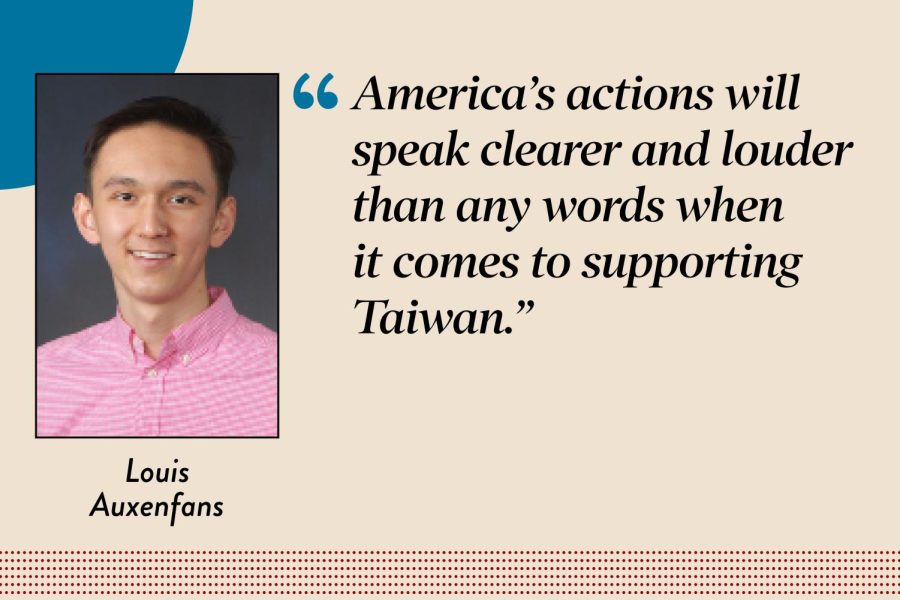To support Taiwan, America needs action, not rhetoric
Midway Staff
Louis Auxenfans argues that the United States needs to take stronger action to support Taiwan.
October 13, 2022
When the Chinese military conducted four days of live-fire military exercises around Taiwan in August, I anxiously tracked the hour-by-hour live updates for fear of my family’s safety in Taiwan. The day before, I had followed with pride House Speaker Nancy Pelosi’s visit to the island, but now I grew worried about the trip’s misunderstandings that could spark a fuse.
Being half-Taiwanese from my mom, I have traveled there a few times to see my mom’s family. My trips have been filled with fond memories of its cheerful, welcoming people and the iconic night market food, filling the streets with delicious fragrances of steaming black pepper buns and oyster omelets. To imagine that those experiences and my whole family could perish if China attacked Taiwan continues to play in the back of my mind.
With the precarious situation of maintaining peace in Taiwan, the United States should focus less on diplomatic rhetoric and more on providing concrete support.
Taiwan, an island slightly larger than Maryland with a population of 23 million, is more than a trivial subject. It produces 90% of the world’s most advanced semiconductors, a key component from artificial intelligence to cars and computers, and if Taiwan were attacked, the destruction of its semiconductor factories would likely lead to a global recession. While Congress recently passed a bill subsidizing $52 billion in domestic semiconductor manufacturing, it will take at least a decade for the US share of semiconductor manufacturing to even reach 10%.
Furthermore, Taiwan is a key democracy in the East Asia region. Its democracy has flourished since it first allowed democratic elections in 1996, and it has an even higher degree of freedom than the United Kingdom, France and the United States, according to Freedom House, a watchdog for free societies. These dual economic and political factors make Taiwan’s defense crucial not just for America’s interests but also all democratic countries.
For the past four decades, America has taken a position of “strategic ambiguity” on Taiwan, staying opaque about supporting Taiwan’s defense. But recently President Biden has repeatedly said that the United States would send troops to defend Taiwan — a break from past diplomacy. While this commitment is welcome for the defending Taiwan, it could backfire if the Chinese government manipulates the message to argue that America has upset the political balance, which it has already hinted at.
Rather than take rhetorical potshots that could inflame tensions, the United States needs to support Taiwan with action. Taiwan has still not received $14 billion in U.S. weapons, and Congress has yet to approve a $1.1 billion arms sales deal. The United States has the right intentions, but with growing uncertainty as analysts warn about war in the next decade, these efforts must be accelerated. The war in Ukraine has shown the importance of defense weapons to repelling attacks, and Taiwan needs a larger weapons stockpile before it could be too late.
Finally, America’s allies in the region, like South Korea, Japan and Australia, should come to a collective agreement to enact economic sanctions on China and support Taiwan if it were attacked. While these partnerships could be interpreted as unnecessary escalation, they will clarify the larger consequences of potential war in Taiwan and force China to think twice about involving more countries in a war. Forming a united military and economic strategy in case of a Chinese invasion, like the NATO response to Russia, can deter an invasion because of the potential global backlash.
Taiwan is more than a tiny Asian island but a symbol of the unifying power in freedom and democracy. Every day that I talk to my Taiwanese grandparents, I am constantly reminded of the importance of peace in Taiwan to maintain those principles. America’s actions will speak clearer and louder than any words when it comes to supporting Taiwan.


















